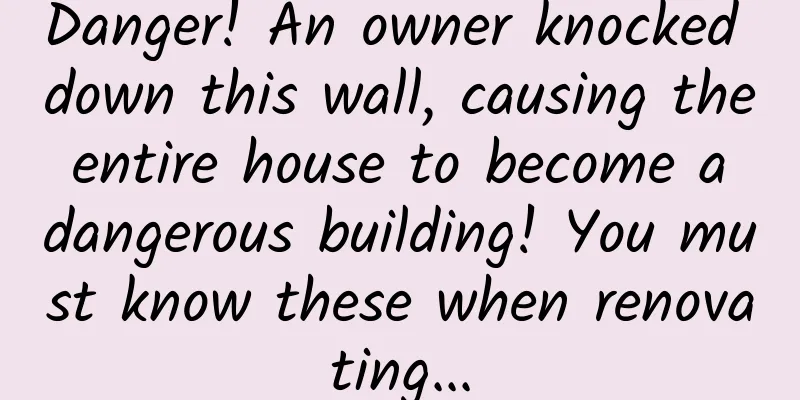Danger! An owner knocked down this wall, causing the entire house to become a dangerous building! You must know these when renovating...

|
Expert: Dr. Xie Qiang, Geotechnical Engineer, Offshore Oil Engineering Company Renovation is actually a very common thing. It is not easy to renovate your own home, and everyone has basically encountered the renovation of their neighbors' homes. But have you ever heard of a whole building becoming a dangerous building due to renovation? Not long ago, in Xiaoshan District of Hangzhou, a homeowner knocked down a load-bearing wall during renovation, which resulted in cracks in the entire building and turned it into a dangerous building. At present, the owner who carried out illegal renovations has been taken into custody, and other residents of the building can only temporarily stay in hotels or seek refuge with relatives and friends. Many people have heard of load-bearing walls, and they all have a general idea that load-bearing walls cannot be destroyed casually, otherwise accidents are likely to occur. But there are so many walls in a house, which one is a load-bearing wall and which one is not? I'm afraid many people can't tell. Today we will talk about the past and present of load-bearing walls. What is a load-bearing wall? A load-bearing wall is a wall that bears weight. In a house structure, a load-bearing wall bears the weight of the upper building and transfers the weight to the foundation, which is equivalent to the skeleton of the house structure. There are load-bearing walls, and correspondingly there are non-load-bearing walls. Non-load-bearing walls are often not set up to transfer the weight of the house. They can serve the function of dividing areas within the house, and their function is a bit like the ancient screens. Three common structures of residential buildings So how should we identify the load-bearing walls that bear such a heavy responsibility? To understand this problem, we need to look at it together with the classification of house structures. Common residential buildings encountered in daily life generally have three structural forms: brick-concrete structure, frame structure and frame-shear structure. Brick-concrete structure is a relatively traditional building structure, mostly used in old houses, and the height of the building is generally not more than 6 stories. In this structure, the vertical load-bearing walls and columns built with bricks or blocks are used, and the horizontal weight is transmitted by beams, floor slabs and roof panels made of reinforced concrete. Therefore, its load-bearing structure is the floor slabs and walls, and all the walls in the house are load-bearing walls. The frame structure is a newer building form than the brick-concrete structure. Houses built with this structure can be taller than brick-concrete structures, but generally will not exceed 15 floors. The frame structure is composed of beams and columns connected by rigid or hinged connections to form a load-bearing system. The horizontal and vertical loads are borne by the frame structure composed of beams and columns. Therefore, the walls generally do not bear any load. The frame-shear structure is a structure that combines a frame structure and a shear wall. The shear wall here is different from the load-bearing wall, and is mainly used to bear lateral loads such as those caused by earthquakes (the load-bearing wall mainly bears the vertical load of the building's own weight). It is precisely because of the existence of shear walls that the frame-shear structure can withstand greater horizontal loads and thus perform better in earthquake resistance. Therefore, the frame-shear structure can be suitable for taller buildings and is more common in high-rise residential buildings. Because shear walls have the specific function of resisting loads in buildings, their importance is no less than that of load-bearing walls, and they cannot be replaced at will during decoration. Three ways to find load-bearing walls So for a specific room, what are the more specific identification methods? These three methods can be used as reference. Tip 1: Measure thickness Reliability index: ★★ In traditional brick-concrete structures, if the wall thickness is less than 12cm, it is generally a non-load-bearing wall. On the contrary, if the wall thickness is greater than 24cm, it is generally a load-bearing wall (24cm is the length of the external wall load-bearing bricks). However, nowadays, hollow bricks are added to the outside of non-load-bearing walls in many house constructions, so it is not easy to distinguish the difference between the two simply by judging by thickness. Tip 2: Listen to the sound Reliability index: ★★★ You can use a small hammer to knock on the wall and listen to the sound. If the sound is thick and low, it may be a load-bearing wall; if the sound is relatively bright or even vibrates, it is a non-load-bearing wall. Tip 3: Look at the drawings and ask the property management Reliability index: ★★★★ If you can find the original house drawings, the information on the drawings will definitely be the most accurate! If you can't find the engineering drawings, you can communicate with the property management to confirm. The property management must have the most accurate information related to the house. What should I do if a load-bearing wall is destroyed? First of all, it should be made clear that demolishing load-bearing walls is illegal. According to Article 26 of the "Regulations on the Management of Earthquake Protection of Housing Construction Projects", damaging load-bearing walls is equivalent to destroying the earthquake protection of the building. Individuals will be fined no more than 1,000 yuan, and units will be fined no less than 10,000 yuan and no more than 30,000 yuan and ordered to correct the problem within a time limit. Load-bearing walls in our buildings Bearing important responsibilities I hope we can all protect it together Make it stand firm Build a safe and stable home for us The pictures in this article with the "Science Popularization China" watermark are all from the copyright gallery. The pictures are not authorized for reprinting. |
<<: Twist your own head off for fun. Can a headless fly survive?
>>: Do animals know numbers? What are their mathematical abilities?
Recommend
Learn ASO from scratch: 10 minutes to learn the basic methods of ASO
Introduction: ASO , which is the abbreviation of ...
Sharing experience: A WAP page with 10,000 daily active users can steadily bring in 2,000 activations every day!
Many companies have websites with good traffic. A...
Electric Technology Car News: With a plain appearance and ordinary interior, how can Ruixing S50T surpass Baojun 730?
At the Chongqing Auto Show last month, the Ruixin...
Decreased immunity, hair loss, loss of appetite? Latest research: Your body may be lacking TA...
Recently, an article published in Nature emphasiz...
There are certain requirements for underwear fabrics. Which one is the true love of your butt?
Just as "there are a thousand Hamlets in the...
If you gain weight after work, it’s not your fault! You work too hard.
Planning and production Source: A Brief History E...
JD Finance 618 operation and promotion strategy!
On June 19, a newcomer appeared at the top of the...
Analyze ten product details to see how big manufacturers design!
Preface Meeting user needs and improving user exp...
Summary of Android channel packaging technology
Introduction This article compares 4 channel pack...
The inside story of Android market promotion channels and tips on how to avoid pitfalls!
What I want to share with you today is the Androi...
Starting from Shenzhou XIV, China's space station will usher in an era of uninterrupted astronaut residence!
The third manned space flight of China's spac...
16 data application analysis platforms to help you improve your operational capabilities
An excellent operator needs to have a lot of know...
The 1.0T plug-in hybrid system makes the MG6 hybrid version the most fuel-efficient performance car
With an acceleration time of 6 seconds to reach 1...
Another gay web drama has become popular, and the driving force behind it is actually a lesbian social APP!
Two dramas are very popular recently. One is call...
A guide to creative optimization of information flow in four popular industries: e-commerce, automobiles, games, and tourism
Information flow advertising has now become an es...









